- Home
- Regan Walker
Rebel Warrior (Medieval Warriors #3) Page 3
Rebel Warrior (Medieval Warriors #3) Read online
Page 3
Each time Steinar wielded his sword, his arm gained strength and his movements became more agile. Now his sword arm was nearly as sure as it had been that day near Stamford Bridge when he fought with King Harold’s army turning away the Norse king, Harald Hardrada. And as sure as that day on Senlac Hill, not long after, when he’d survived the onslaught of the Conqueror’s knights only to watch his father and the Saxon King Harold fall. Steinar’s escape north with some of King Harold’s elite guards, the huscarls, had been all that stood between him and death that day.
His last battle had been in York with Edgar the Ætheling, rightful heir to the English throne. Steinar well remembered the vicious fighting, for it was there he had received the wound that all believed had left him a cripple.
Once he arrived in the clearing, he set about his practice in earnest.
In one smooth arc, he slashed his steel blade through the air, the flash of sunlight on metal sending a surge of strength coursing through him. He could feel the power return to his arm that for so long had lifted only a quill as his ink-stained fingers attested. Soon he would wield a sword as well as his sister, Serena, wielded her bow. If only his leg would perform as it once had, he would be whole.
In his mind he fought the Norman knights on Senlac Hill, deflecting their blows and ripping through flesh. Swinging his sword wide, he saw his father fall. The remembered shock caused his right leg to crumple and he stumbled. Muttering an oath, he wobbled to one side of the path to lean against a tree, wiping the sweat from his brow, his chest heaving from exertion.
He hissed a curse. Had he fought a real enemy, he would be dead. The leg was not yet at full strength and mayhap not his mind either. He vowed one day ’twould be so. He would yet be the warrior he once was.
“It seems you have been keeping secrets from me. I should have known that muscle you have been adding to your arms did not come from tossing about a quill.”
The deep voice was Rhodri’s and with his words, Steinar relaxed and looked around for his friend. Dressed in hosen, tunic and leather jerkin in the colors of the forest, Rhodri blended in with the foliage so as to be near invisible where he stood against a tree, his arms crossed over his chest. The bard was slight of build but strong with a bowman’s muscled arms and a head of black curls and deep-set brown eyes.
“Do you battle your demons, Steinar?”
“Some. But I also spar with teachers who once sharpened my skills. As you can see, I am not yet there. The leg fails me often.”
“But you will be strong again. You were once the best swordsman at Talisand, or so Theodric claimed.” Leaving the tree, Rhodri came closer. “When you are recovered, what then?”
Steinar slid his sword into its scabbard and limped to his friend, his leg telling him he had pushed it too hard. “When that day arrives, we will see. For now I remain the king’s scribe. Malcolm seems content with my service.”
“Aye, he is. But you came here to prove something and I’m thinking ’twas not just that you can again wield a sword.”
“You may be right,” he admitted, looking down at the forest floor covered in the green grass of spring. Lifting his head to face his friend’s expectant gaze, he added, “I would test my resolve to fight the Bastard Norman again. After all, Malcolm has faced William’s knights more than once and come away the victor. But for now I remain a scribe.”
Rhodri gave him an assessing glance. “You can be more than one thing,” he said, adding in an amused tone, “I am.”
Steinar grinned. “ ’Tis why the king has his bard training his archers.”
“I do not mind. Like you, I need the practice.”
Together, they slowly walked back to Malcolm’s tower where they shared a chamber, the limping English scribe and the Welsh bard, each harboring a secret.
* * *
To Catrìona’s relief, the ride to Dunfermline had not been as long as the journey to Dunkeld the year before, nor so sad. It was oddly comforting to leave behind her past and set forth on a new adventure, one that would lead to her future with Domnall. With every mile she traveled, her spirits had risen knowing she would see him that evening.
Midday they had stopped at the River Earn to water the horses and eat a hasty meal of bannocks, cheese and berries before resuming the journey south. There were eight of them with Angus, Niall and her uncle’s three guards.
Their small company arrived in Dunfermline at day’s end, passing tall stands of trees to cross a stream, before riding up a long path to a rocky plateau where they dismounted. Facing her was a massive square tower made of hewn stone blocks. Catrìona tilted her head back to take in its height, so much greater than either her father’s hillfort or her uncle’s home in Atholl. The tall tower, the like of which she had never seen, seemed a fitting fortress for the king, impregnable in its appearance. And it would be her new home, at least until she and Domnall were wed.
Two men flanked the large carved wooden door that led into the tower, their gazes fixed on the new arrivals. From their muscled bodies, sheathed swords and proud stance, she judged them to be guards.
Suddenly, the large oaken door opened and the king and queen stepped outside.
Catrìona would have known Malcolm, King of Scots, even if he had not been wearing a gold crown and royal attire. Tall of stature and noble of bearing, his dark hair fell to his broad shoulders and he wore a well-trimmed mustache and beard. His eyes exuded power and intelligence as his gaze roved over the small group standing with the Mormaer of Atholl. For all his elegance, the king’s hardened face told her he was a warrior still.
The king smiled widely and strolled up to Matad greeting him and her brother, as men are wont to do, leaving his queen to deal with the women. It was the same way her father had treated men of rank and their wives visiting the vale. Malcolm and her uncle easily conversed, making it apparent to Catrìona they were good friends.
The queen walked towards Catrìona and Fia, her movements graceful. As fair as her husband was dark, Margaret was serenely beautiful in a gown of yellow silk, finely embroidered with blue flowers at the neck and wrists. She appeared delicate and slight of form despite that her slightly rounded belly suggested she was with child. Her long flaxen plaits hung below her headcloth encircled with a delicate, gold crown. The blue ribands wrapped around her plaits matched her sky-colored eyes.
Margaret quickly put Catrìona at ease with her warm smile. “Welcome to Dunfermline,” she said in Gaelic. Then looking from Catrìona to Fia, she said, “I understand you two are to be my new ladies and I am told you both speak the Saxon tongue.”
Catrìona and Fia curtsied. “My Lady,” they said in unison with downcast eyes, Catrìona adding in the Saxon tongue, “Aye, we speak both languages as well as Latin.”
“That is most agreeable,” said the queen. “I know you must be tired. Your chamber has been made ready to allow you to change ere we dine. The servants will escort you there and see your chests are brought to you.”
Taking her leave, the queen joined her husband and Matad. As Catrìona watched her walk away, she could not help but wonder if beneath the delicate exterior the queen possessed an inward strength. Else how could she deal with a hardened warrior like Malcolm?
Fia started to follow a servant who beckoned them toward the tower.
Catrìona stopped her with an outstretched arm. “I must see Kessog settled.”
“While you see to your falcon, I will see to our chamber. I am anxious to know where we will be lodged.” Excitement once again danced in Fia’s eyes as she hurried to follow the servant. Catrìona was happy for her cousin. It had been Fia’s dream to be one of the queen’s ladies; she had talked of little else.
Disappointed that Domnall had not been there to meet her, Catrìona waited for Niall who was coming toward her. “Want to come with me to see the mews?”
Niall nodded and walked with her to her horse where she lifted Kessog from his perch.
“The king’s house is large,” he remarked, looki
ng back at the tower.
“Aye, ’tis the royal seat.”
In response to her inquiry, a servant pointed them in the direction of the mews, which lay just beyond the stables. The wooden building that housed the king’s hawks was twice the size of the mews maintained by her uncle, but then a king would have a large house for his many birds.
Stepping over the threshold of the dimly lit structure, she glimpsed rows of perches on which were settled many hooded birds.
A smoothed-faced young man with a prominent nose and kind eyes introduced himself.
“Welcome. I am Machar, the king’s falconer.”
“I am Catrìona, one of the queen’s new ladies, and this is my brother, Niall.”
She extended her gauntleted hand, passing the falcon’s jesses to Machar. “And this is Kessog.”
Machar carefully lifted the falcon to his own gauntlet, murmuring soothing words and calming the bird with practiced strokes. “A fine tiercel,” he said, using the term for a male peregrine. “He is most welcome to join the hawks I tend for the king and his chiefs.”
Niall and Machar exchanged a few words as Niall told the falconer of their home in the vale where Kessog had been raised and trained, not disclosing the tragedy they had survived a year earlier. They did not often speak of that time except to each other.
Even in the dim light from the single window, Catrìona could see the many perches held a gyrfalcon, several peregrines and various other hawks. “So many falcons,” she said in awe. “The king must love to hunt.”
“Aye, that he does, from the time he lived in England before he claimed the throne. King Edward was fond of the sport. Some of Malcolm’s men also hunt to the hawk.” With a smile he added, “You will frequently dine on roast duck.”
“Kessog has not flown this day, but I have fed him,” she advised the falconer. “We traveled from our uncle’s home in Dunkeld.”
“I will see to him, my lady,” he said confidently. “Mayhap you might like to join me in flying him?” he asked Niall. “The days are long and there is still good light.”
“Tomorrow, aye. But tonight we are expected at the king’s table.”
“Are many of the hawks you tend owned by ladies?” Catrìona interjected, suspecting the answer would not be to her liking.
Machar laughed, but sobered when he saw her frown. “There are not many ladies that care to risk their skirts and their lives up on yon crags, scrambling to catch themselves a chick to train. Owned, no. The ladies of a few visiting nobles can fly birds, but when they’re here, they fly the king’s hawks.”
Catrìona remembered well the lengths to which she had gone to catch and then train Kessog. Winning his trust had taken time, getting him accustomed to her voice, her touch. Feeding him was a constant task, made easier by her father’s falconer, as Kessog was trained to hunt for sport and did not eat his kill.
At her look of disappointment, Machar explained, “The ladies hereabouts—that is, the queen and her ladies—busy themselves mostly with prayer and needlework. They might wave at the men riding out to hunt, but they do not ride with them.”
Niall shot her a glance, amusement dancing in his eyes.
“Well then,” she said, “mayhap ’twill be my brother who will fly Kessog most often in the time remaining before his summer molt.”
Catrìona felt better for leaving her falcon in the care of another, knowing Machar and Niall would keep Kessog happy when she could not attend him.
With a nod toward her brother, she left them to seek out her cousin. Her uncle had told her that she and Fia would likely share a small chamber in the tower, as did the queen’s other ladies.
She entered the tower and stopped to admire the great hall. Two long trestle tables flanked a central hearth. At the head of the two tables was another table set upon a dais. The king’s table. All the seats were benches save two high-backed chairs on the dais where she imagined the king and queen would sit tonight.
A servant, observing her looking around the hall, told her the ladies’ chambers were on the second floor as were the chambers of the king and queen and offered to show her the one assigned to her and Fia.
Catrìona climbed the stairs behind the servant, who stopped on the second story where a long corridor with a window at the end contained many doors. When she asked, the servant told her the corridor wrapped around the square tower.
The servant stopped in front of one chamber midway down the corridor and gestured to the door. Catrìona thanked her and entered to find Fia bent over her chest, digging through garments.
Lifting one of her gowns, Fia looked over her shoulder to where Catrìona stood appraising the room. “They brought your chest,” Fia said, pointing to the end of the other bed. “There are pegs for our cloaks, too.”
The chamber was sparsely appointed but more than adequate to Catrìona’s mind. Two narrow beds took up most of the space. Atop them were well-stuffed bed cushions lain with blue woolen covers. The only other furniture was a small table between the beds, a brazier for warmth, a side table and a stool. Catrìona walked to the one window. Its shutters open, she looked down on the burn that flowed around the king’s tower on three sides like a moat.
“ ’Tis not as large as your bedchamber in Atholl,” she said, “but will serve us well.”
“Aye,” Fia agreed. “ ’Tis clean and at least we are alone.”
Catrìona sat upon the bed that would be hers, the one closest to the window. “ ’Tis comfortable.”
“Mine, as well. Oh, a servant brought us water to wash.” Fia pointed to a pitcher and a bowl sitting on the side table.
“I passed quite a few servants speaking English to each other on my way here,” Catrìona remarked. “I wonder why there are so many.”
“Some English fled the Normans,” said Fia, “and thankfully, the ones I spoke with can speak a bit of Gaelic as well as the Saxon tongue.”
Feeling quite gritty from the day’s ride, Catrìona walked to the side table and proceeded to wash the dust from her face. “I would love a bath but I suppose ’twill have to wait.”
Fia refolded her gowns into the chest. “With so many lodged in the king’s tower, even with a great number of servants it must be difficult to provide baths for all.”
“Mayhap there is a stream that affords privacy.” Catrìona spoke her thought aloud. The water would be cold but at least she would be clean.
“With so many men around, only you would think of bathing in a stream.”
Catrìona opened her chest, mumbling to herself about preferring to be clean even if she had to wash in the woods surrounded by men.
Soon they were both somewhat refreshed and had helped each other to don proper gowns.
“We do not really need a servant to help us dress,” observed Catrìona, “and I doubt one will be provided. Here, I will help you do your plaits and you can help me with mine.”
By the time they arrived in the hall, the cavernous room was filling with those attending the evening meal. Torches set in sconces, a fire in the stone hearth and candles provided ample light.
Catrìona and Fia stood to one side watching those assembled. Boisterous conversations erupted in laughter, some in Gaelic but others in the Saxon tongue. Most of those in attendance were men but some women mingled among them, which was a comfort to Catrìona. Spotting the queen surrounded by several other women, Catrìona tugged on Fia’s sleeve.
“ ’Tis the queen and her ladies. Let us join them.”
They launched forth, passing clusters of men and drawing interested stares. Catrìona attributed their curious gazes to the fact she and Fia were new. Or, it could be her bright auburn hair. Her father had once told her, “Anyone would know you are mine by that thick head of dark red hair, little cat.” She felt, but did not return, the men’s stares as she guided Fia through the throng to where the queen stood.
Margaret had changed into another beautiful gown, this one azure silk embroidered in golden thread at the neck and sle
eves. Seeing Catrìona approach, the queen raised her head to greet them. “My new ladies… did you find all you needed in your chamber?”
“Yea,” said Catrìona, “and we thank you, My Lady, for your kindness.”
Margaret gestured toward the women standing with her. “These are your fellow ladies. I will allow them to introduce themselves.”
First came Audra with light brown hair and hazel eyes. “I am the daughter of Duff, Mormaer of Fife. I bid you welcome.”
The woman’s pleasant face and unassuming air contrasted with what Catrìona knew of the Mormaer of Fife, the warrior who led the king’s army. Since Dunfermline was in Fife, to make conversation, Catrìona said, “You did not have far to travel.”
“Nay, not far,” Audra said with a smile.
Next in the circle of women was Davina. “I come from Lothian to the south.” Her sweet smile was set in a round face with brown eyes framed by honey-colored hair. By her expression, Catrìona judged her to have a genial nature. “Welcome,” was all Davina said.
Mayhap she is shy.
Isobel, darker in both hair and skin than the others, was quick to inform them she had served Margaret since she became queen two years ago. Catrìona thought she heard Isobel say she was from Ross in the north.
Lastly, there was Elspeth. “I am from west of Fife near Loch Tay.” To Catrìona’s mind, by her giddy demeanor, Elspeth appeared to be the youngest of the ladies, especially after seeing the flirtatious looks she flung at the men with her large brown eyes that were the same color as her hair. A charming imp.
“We passed Loch Tay as we traveled to Dunkeld a year ago,” said Catrìona. “ ’Tis very beautiful.” She resisted the urge to say Loch Lomond was far more resplendent. She was very proud of the beauty of the vale.
“Aye, Loch Tay is grand,” said Elspeth, stretching out the word “grand”.
Catrìona thanked the women for their welcome. She could scarce recall their names, much less which one came from where. In time I will know them well.

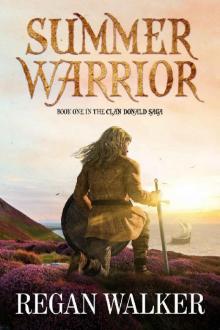 Summer Warrior (The Clan Donald Saga Book 1)
Summer Warrior (The Clan Donald Saga Book 1) Echo in the Wind
Echo in the Wind Once Upon a Christmas Past
Once Upon a Christmas Past A Secret Scottish Christmas (Agents of the Crown Book 4)
A Secret Scottish Christmas (Agents of the Crown Book 4)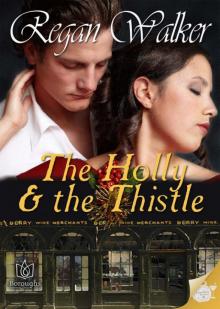 The Holly and the Thistle
The Holly and the Thistle Racing with the Wind (Agents of the Crown)
Racing with the Wind (Agents of the Crown) Wind Raven (Agents of the Crown)
Wind Raven (Agents of the Crown)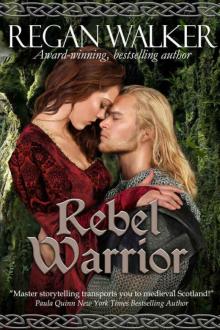 Rebel Warrior (Medieval Warriors #3)
Rebel Warrior (Medieval Warriors #3)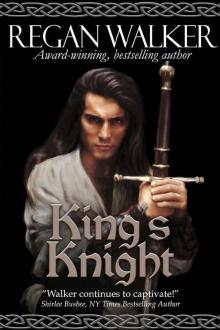 King's Knight (Medieval Warriors Book 4)
King's Knight (Medieval Warriors Book 4)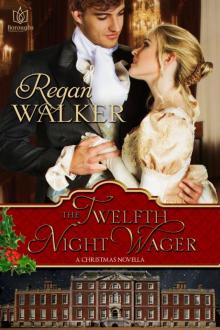 The Twelfth Night Wager
The Twelfth Night Wager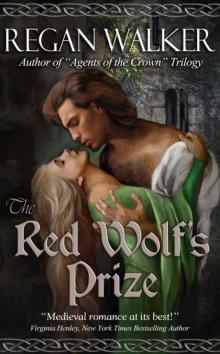 The Red Wolf's Prize
The Red Wolf's Prize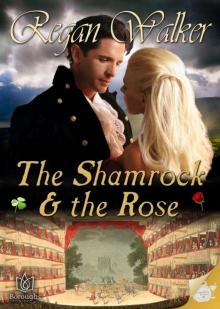 The Shamrock & the Rose
The Shamrock & the Rose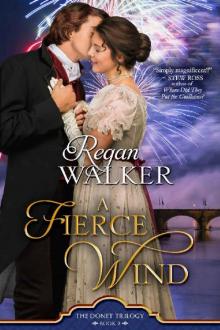 A Fierce Wind (Donet Trilogy Book 3)
A Fierce Wind (Donet Trilogy Book 3)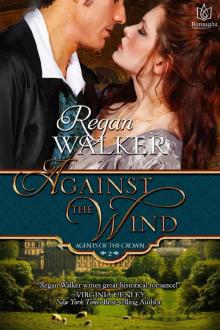 Against the Wind (Agents of the Crown Book 2)
Against the Wind (Agents of the Crown Book 2)